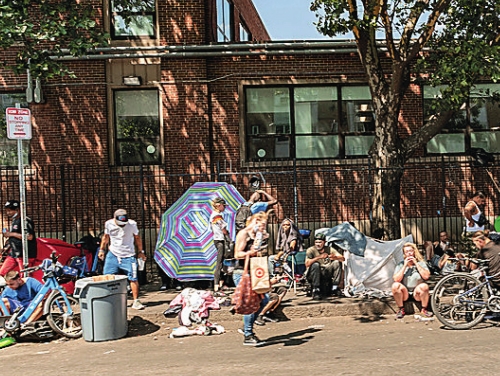
The drug problem at Mass and Cass is still an issue according to testimony given at a city council hearing on Tuesday as police deployments in the area move the population across the city.
“I continue to hear from many who live and work in Andrew Square, in the South End, in Dorchester, Downtown Boston, Beacon Hill, Back Bay, about open drug markets happening in many places across the city,” said Councilor Ed Flynn, lead sponsor of the hearing.
Many
parents have said to me they don’t feel safe here. Especially with
their children. Their quality of life has declined significantly.”
Flynn believes that along with continued state and local resources, the humanitarian crisis requires federal involvement.
A
panel of officials testifying on behalf of the Boston Police
Department, the coordinated response team, the Boston Public Health
Commission and the Bureau of Recovery Services, highlighted that
progress has been made in both public safety and health on Mass and
Cass, but that multipronged approach of short term and long-term
solutions are necessary.
Boston
Police Deputy Superintendent Dan Humphreys said that progress has been
made in public safety, especially in the last thirty days with a new
deployment effort in and around the Mass and Cass area.
“Obviously
the work is ongoing,” said Humphreys, “but we see clear progress from
where we were a year ago. Now we are communicating and coordinating with
the new director of the CRT to have a broader deployment citywide,
focused on areas where we’re hearing feedback from the community.”
Kelly
Young, the new director of the Coordinated Response Team (CRT), plans
to have her team receive diversion and deflection training, allowing
them to more effectively partner with police.
City
officials agreed that what’s needed now is for a broader, citywide,
approach. As those crowds of people have been largely dispersed from
Melina Cass Boulevard and Massachusetts Avenue, pushing them into
neighborhoods across the city.
Bisola
Ojikutu, commissioner of public health and executive director of the
Boston Public Health Commission said that from a public health
perspective, efforts like outreach, low threshold housing, detoxing
programs and needle cleanup resources through 311 have been effective in
combating the crises. What has been a challenge, she said, is long term
follow up with those that seek services. “Overdose deaths are actually
down, if you compare this year to last year. I think that’s an important
piece of the puzzle here, that we have people who dying, and we
certainly had an increase in overdose deaths. And there is less visible
crowding.”
Many
community members expressed displeasure with the moving around of
homeless and addicted populations, describing more needles, garbage,
human waste and more dangerous conditions in their neighborhoods as a
result.
Some providing
testimony posited that the focus needs to be put more towards recovery
rather than harm reduction and more aggressively pursue drug dealers.
Others identified a need for more long-term recovery options, filling
the gap left following the closure of the Long Island Bridge.